Summary: Intermittent Fasting for Brain Health
There is actual-factual science to back up the popular trend of intermittent fasting (IF), although most of it pertains to preclinical animal research and loosely relevant human trials. IF differs from traditional dieting in that the diet mostly dictates when you eat without placing any demands on what or how much you need to eat. The purported benefits of IF include: weight management, muscle gain, clear cognition, balanced metabolism, stress resistance, and more. Admittedly, aside from the metabolic advantages of fasting, IF naturally makes reducing your overall daily caloric intake much easier. Even though IF doesn’t require any calorie restrictions, it does work as an effective means against overeating. Nonetheless, however you want to spin it, IF does hold significant promise for boosting brainpower and slimming your physique. Personally, I have found IF successful in helping me stay mentally productive and physically fit.
Page Contents
Can I Take Nootropic Supplements While Intermittent Fasting?
Here’s a question I’m frequently asked: Do supplements break your fast?
After all, when you’re fasting, it’s well-known that you can still drink water and coffee. But how delicate, really, are the metabolic advantages of intermittent fasting? Do you need to worry about gelatinous capsules and all that filler that goes into a supplement, even if the ingredients are quote-unquote “fast friendly”?
It depends on the supplement.
However, I’d wager that many nootropic supplements at least are safe (not even safe but recommended) to take while fasting, especially considering how fasting, despite its well-documented advantages, can be absolutely devastating to your thinking power in the short-term — not to mention your mood and general likability.
While intermittent fasting may affect many measures of health and performance across the body, I am mostly focusing on how IF affects brain health and cognitive performance in this article. I’ll even include a list of the best nootropics to you can take to make the most of your IF efforts.
But before getting into all that, let’s untangle what exactly we mean when we say “intermittent fasting.”
Intermittent Fasting vs. Caloric Restriction: What’s the Difference?
The first question that we need to address: Is intermittent fasting (IF) simply a contrived method of caloric restriction (CR)?
For those new to the party, the definitions of both practices are:
Intermittent Fasting
The catch-all term for any regimented cycle of periodic fasting and feeding as a form of health optimization. Depending on the fasting length and feeding intake, benefits may encompass a range anywhere from weight loss to weight gain, enhanced cognition to improved immunity to saved money.
Caloric Restriction
A dietary regimen that calls for a reduction in calorie (or energy) intake (by 20-40%) while maintaining proper nutritional measures, i.e., without cutting the essential nutrients. The concept dates back to the 15th century, linked to the Venetian nobleman Luigi Cornaro’s book Discorsi della vita sobria (or Discourses On the Temperate Life), in which he described the healing effects of a diet reduced to 350 grams of food and 414 mL of wine daily.

Essentially, intermittent fasting may be used as a tool of caloric restriction, yet you don’t necessarily need to restrict your overall caloric intake to partake in intermittent fasting. For example, IF bodybuilders may fast for a 24-hour span, then more than double their usual daily caloric intake the following day. This is because, theoretically, the benefits lie in the adaptive changes that occur during the fasting period more so than the calories consumed during the feeding stages.
In most cases, maintaining the same energy intake is literally half the battle. As such:
Intermittent fasting is not dieting, it’s scheduling.
And, of course, adhering to that schedule. To understand why anyone would ever possibly want to do this, we’ll need to take a look at the body’s adaptive states to feeding and fasting, the molecular mechanisms at play, and how they might benefit our health, cognitive and otherwise.
Related: Burn Lab Pro Review
How Intermittent Fasting Works
When you eat, you’re in a metabolic fed state, which generally involves the digestion, absorption, and breakdown (or storage) of food. This state begins with your first bite, lasting anywhere from 3 to 5 hours, during which insulin levels spike, blood rushes to the gut, and you metabolically enter “rest-and-digest” mode.
The need for relaxation, or postprandial somnolence, after eating is the well-known state of drowsiness that follows a meal, an event marked by a feeling of low energy that’s a result of the parasympathetic rest-and-digest activation of the nervous system. In response, brainwaves shift to sleep-time frequencies, insulin prevents fat burning, and mental task performance dips.
Conversely, a fast state, which follows the fed state, reverts the parasympathetic activation, allowing the body to burn fat for energy — i.e., ketogenesis — and enhance cognitive functions through the following stress-adaptive molecular pathways:
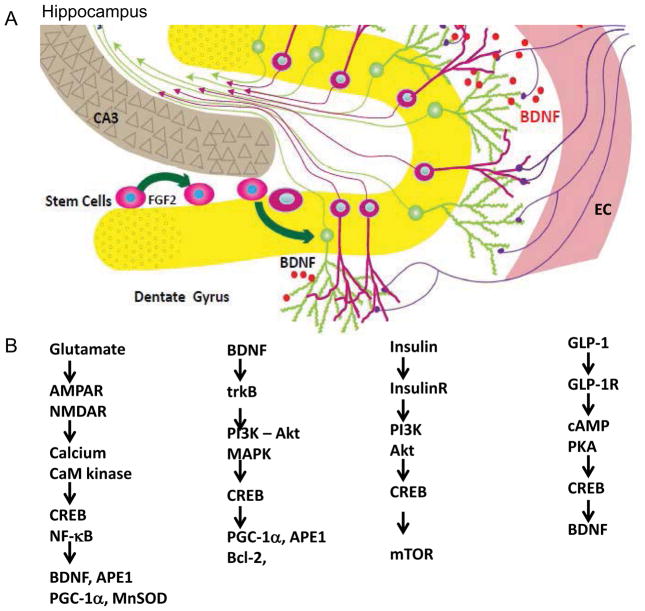
During the fast state, the brain reacts by adapting to the “stress” of fasting: e.g., brain-derived neurotrophic factor (BDNF) levels increase, promoting neurogenesis and repair in the hippocampus; the production of signaling molecules (e.g., glutamate, GLP-1) increases, upregulating cellular communication in the brain, effectively priming the brain to deal with this “stressful” situation. The result may be neuroprotective in the long-term, keeping the brain fresh and active as opposed to its condition under perpetual postprandial stagnation.
Check out this TED Talk by Dr. Mark Mattson, the Chief of the Laboratory of Neurosciences at the National Institute on Aging at NIH:
With regards to IF’s neuroprotective potential, one mice study found dietary restriction (DR) to improve neuroprotection against stress, indicated by a reduction in serum glucocorticoids (i.e., stress hormones). On the human plane, a separate study hypothesized IF to be superior to CR in its sustainability, concluding the practice to be “acceptable in healthy individuals” with the potential upshot of increasing the body’s natural antioxidant defense mechanisms.
Exciting stuff, yet what we know about IF and human health remains predominantly preclinical, a point frequently mentioned in IF research. Even so, the preclinical findings corroborate with several standing theories on evolutionary human physiology, pointing to a variety of cognitive benefits that practitioners often categorize as “nootropic.”
The Brain Health Benefits of Fasting
The molecular pathways mentioned above — increased BDNF, ketogenesis, antioxidant capacity, more — combine for a variety of cognitive benefits, most notably:
- Improved memory
- Clearer thinking
- Increased stress resistance
- Energized mental output
- Optimized mood balance
Animal studies indicate that IF may bolster resistance to neurodegeneration, i.e., age-related cognitive decline — however, long-term human studies will be required before this can be viewed as clinical fact. On that point, IF is popular among the anti-aging community for its general enhancement on healthy living. While I try to keep it real on “fountain-of-youth” longevity claims, IF makes a strong case for its life-stretching potential.
Other Benefits of Intermittent Fasting
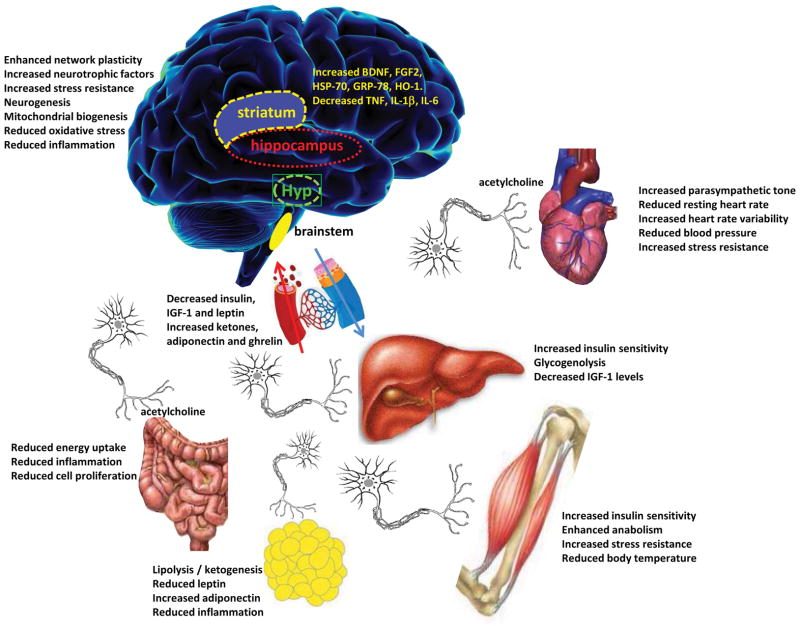
In the article “Fasting: Molecular Mechanisms and Clinical Applications”, the descriptor underlying the figure above states:
The brain communicates with all of the peripheral organs involved in energy metabolism. IF enhances parasympathetic activity (mediated by the neurotransmitter acetylcholine) in the autonomic neurons that innervate the gut, heart and arteries, resulting in improved gut motility and reduced heart rate and blood pressure. By depleting glycogen from liver cells, fasting results in lipolysis and the generation of ketone bodies resulting in a reduction in body fat. IF enhances insulin sensitivity of muscle and liver cells, and reduces IGF-1 production. Levels of oxidative stress and inflammation are reduced throughout the body and brain in response to IF.”
The interplay between insulin sensitivity and energy metabolism particularly elevates IF as a potentially superior option to traditional dieting for weight management.
Intermittent Fasting with Nootropics
Are nootropics “cheating” the fasted state?
This is a recurrent Reddit question on /r/Nootropics, and for good reason: even if you’re not quote-unquote “feeding,” you don’t want to trigger the feed state pathways (e.g., insulin activity) by consuming anti-fast state compounds. Whatever those may be.
Conversely, enhancing fast state functionality via nootropic, or even non-nootropic, substances carries mass appeal among IF enthusiasts. I personally believe there are nootropics that not only maintain healthy cognition but bolster IF cognition. Admittedly, this belief comes with slight trepidation, at least until more clinical research on IF + supplementation becomes available, yet there are a few specific substances I am confident help the IF process, starting with:
Alpha Lipoic Acid
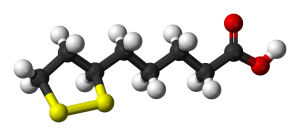
This entry is predicated on the article “Dietary lipoic acid supplementation can mimic or block the effect of dietary restriction on life span.” This is tricky: ALA mimics or blocks the effect of DR. That’s not very assuring. However, the study clarifies that supplementing ALA immediately post-fasting extends the fast benefits, whereas supplementing ALA immediately pre-fast inhibits the fasting characteristics. Thus, ALA potentially supplies mimetic benefits of DR when consumed at the start of the feed period, extending the “survival characteristics of DR” beyond the fast’s termination. More on Alpha Lipoic Acid.
Resveratrol or Pterostilbene
Resveratrol and, to an even greater extent, pterostilbene, a polyphenol that’s 4x more bioavailable than resveratrol, enhance the body’s antioxidant capacity, aiding the brain and body’s defense against free radical damage. In animal samples, the compound maintains homeostasis via autophagy, a physiological process that turns over damaged cells for new cell formation. With IF, the bioeffect delivers a double benefit of creating new cells while fueling the process with the elimination of old, inefficient cells and organelles. More on Pterostilbene.
Gotu Kola
Rather than simply providing antioxidants, Gotu Kola benefits the brain’s antioxidant capacity by increasing natural brain levels of glutathionine and catalase, defense compounds synthesized against free radical damage. While that’s cool and all, Gotu Kola takes it even further by aiding neurite growth through the increased release of BDNF. This bioeffect is not only unique to herbal nootropics but illustrates Gotu Kola’s significant therapeutic potential in IF and general cognitive wellbeing. I began doubling down on this herb when I took to IF, and the experience can only be described as positive. More on Gotu Kola.
L-Tyrosine
Here’s the idea: IF benefits catecholamine release (dopamine, norepinephrine) to engage the body’s awake and alert mechanisms. L-tyrosine converts to catecholamines, potentially potentiating IF’s catecholaminergic effect. Tyrosine is particularly known for its conditional support during stress states, which essentially sums up the body’s fast state. On that note, I’m hesitant to include tyrosine on this list — does it chemically interrupt the body’s natural adaptive stress response? — yet I’m willing to include the amino for its demonstrated benefits on energy metabolism (when mixed with caffeine). More on L-Tyrosine.
Rhodiola Rosea

Does Rhodiola break your fast? Similar to Gotu Kola, Rhodiola rosea toes the line on “cheating” during the fasting phase, particularly if you’re supplementing the herb in raw plant or powder form. Even so, Rhodiola’s anti-fatigue mental boosts have been a godsend in my IF experience, an advantage evidenced by this rat study‘s findings of Rhodiola ameliorating insulin resistance, i.e., supporting insulin sensitivity. With regards to IF, no research has yet to demonstrate Rhodiola’s effects on fasting or feeding, although the anecdotal evidence in support of IF + Rhodiola is almost unanimously positive. More on Rhodiola.
Green Tea
Straight, old-fashioned, leafy green tea. Not green tea extract but the real deal, and lots and lots of it. This is my personal suggestion: drink green tea while practicing IF. Many IF enthusiasts recommend coffee, and this is fine (coffee is great for a suppressed appetite and detoxed liver), but nothing beats a full pot of green tea to: A) tide over your appetite until feasting time, B) relax and sharpen your focus, and C) fulfill your self-satisfaction in consuming a hefty supply of brain healthy antioxidants (e.g., EGCG). And tossing in additional L-theanine may further optimize the cognitive experience. More on L-Theanine.
Citicoline + Racetams
If citicoline and racetams (e.g., piracetam, Noopept) do nothing to inhibit the IF process, go for it. This is a powerful, well-backed stack that, judging by sparse research on citicoline’s neuroprotective effects on brain damaged states, may actually benefit the IF cause. Alpha-GPC or any other racetam may also work as stand-ins for either citicoline or piracetam/Noopept, although the former duo is my personal preference. More on Citicoline.
Bonus: Branched Chain Amino Acids (BCAA)
Do not supplement BCAAs while fasting. These protein-building aminos are highly insulinogenic, overriding the metabolic benefits of IF. Rather, wait until the feeding state to consume BCAAs, which in turn may require for you to workout only during the feed states as well, to maximize the aminos’ muscle-building benefits. On that note, the increase in insulin sensitivity and growth hormone should theoretically potentiate the benefits of BCAAs in the long-run.
My Experience with Intermittent Fasting
The primary benefits I experienced with IF: Lean muscle and energy.
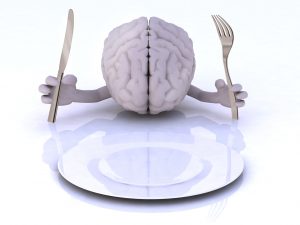
The secondary benefits ranged from free time in the morning (I habitually skipped breakfast), extra money in my pocket (breakfast burritos with sides of guac, potatoes, and bacon are expensive), clearer thinking throughout the day, to the motivational spikes that come with the feeling of getting your life together and organized.
With that in mind, you may attribute any cognitive or health benefits to the generally cleaner, healthier habits I peripherally obtained through the IF process. My inner pragmatist tells me that ultimately doesn’t matter.
My IF schedule ran as follows:
- Day 1 – Fast 24 hours.
- Day 2 – Feed from 12 – 8p, double the normal intake.
- Day 3+ – Feed from 12 – 8p, normal caloric intake. Repeat next day.
Naturally, I quit booze beyond 8p, which means I quit the late-night binge-drinking, a major offense to brain and body health in general. As a consequence, my body leaned up, I gained an additional 10 lbs (from 205 to 215 lbs) in strength-trained muscle, and my morning grog turned into “get-up-and-go” energy.
And in turn that energy translated to more productive days and an overall more energetic mindset.
Related:
Best Sleep Supplements
Intermittent Fasting Schedules
Daily Fasting
Most commonly, this involves cooking (or buying) one or two fewer meals during the day — say, breakfast or dinner. I prefer the more common method of skipping breakfast, saving the 8-hour eating period for 12 to 8p — or 2 to 10p, if you’re the eat-before-bed bodybuilding type. Usually, skipping breakfast makes the most sense, given it’s a meal that requires less social obligation to partake with others.
Take note: Skipping one meal per day is a much more subtle change than what the next two schedules entail, requiring an initially conscious effort to eat more during the feeding periods.
Alternate Day Fasting
Eat for a day. Fast for a day. Eat for a day. So on and so forth.
An easy pattern to remember, yet one of the harder schedules to follow for a couple reasons:
- The fasting periods are long
- Doubling intake on feeding periods can be a chore
Particularly if you’re a “healthy” eater, even moderately so (I assume you are if you’re interested in IF), there’s a habitual resistance built-up to “excessively” feasting throughout a day. I personally avoid this method, despite its frequent use in research. More enthusiastic IF participants enjoy the longer, and thus hypothetically more beneficial, fasting periods. I’m not that hardcore.
Weekly Fasting
Pick a day of the week. Don’t eat that day, i.e., 24-hour span. Then resume your normal eating habits throughout the remaining days of the week. Ditto for Monthly Fasting, except replace “week” with “month.”
Many IF enthusiasts view this as an easy introduction to the practice. Perhaps this is true. I personally still find the fasting for 24-hours less sustainable than regularly skipping breaking/not eating late, even if it’s only a once-per-week 24-hour fast. Also, this is the least efficient “weight loss” method of IF, which may actually make it appealing to bodybuilders or weight-gaining athletes who would like to reap the occasional benefits of IF while maintaining their demanding weight goals.
Best Nootropic Supplements for Intermittent Fasting
Nootropics for intermittent fasting is a tough sell, considering that intermittent fasting involves the rejection of consumption — not additional supplementary consumption. However, if you’re willing to supplement nootropics as part of your intermittent fasting routine, might as well supplement the best nootropic supplements for intermittent fasting. (Or at least some generally awesome nootropics, with or without the fasting.) Of course, this is up for heated debate, but here are my selections for the best premade nootropic supplements for intermittent fasting:
Performance Lab Energy
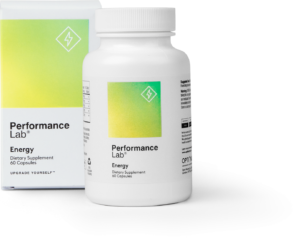 Whereas many energy booster supplements simply tack on caffeine or some other synthetic stimulant, Performance Lab Energy boosts energy by boosting the brain and body’s natural energy production capacity. Specifically the brain and body’s mitochondrial capacity. For the intermittent faster, this is great news: healthy mitochondrial ATP output equals healthy energy metabolism and balance.
Whereas many energy booster supplements simply tack on caffeine or some other synthetic stimulant, Performance Lab Energy boosts energy by boosting the brain and body’s natural energy production capacity. Specifically the brain and body’s mitochondrial capacity. For the intermittent faster, this is great news: healthy mitochondrial ATP output equals healthy energy metabolism and balance.
On the fat loss end, part of Performance Lab Energy’s bio-active design involves increasing the rate at which mitochondria burn fatty acid fuel for energy. One such popular nootropic / fat burner amino for the task: Acetyl L-Carnitine.
However, in addition to ALCAR, Performance Lab Energy supplies brain healthy antioxidants, neuroprotectors, and mitochondria boosters, including the aforementioned Alpha Lipoic Acid (in premium Microencapsulated Bio-Enhanced® form). With all that, Performance Lab Energy is a great supplement to take at the beginning of your IF routine’s “feast” segments.
Mind Lab Pro
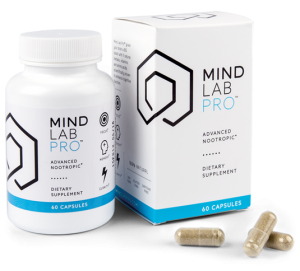 Mind Lab Pro has the antioxidants, the adaptogens, the cholinergics — simply put, Mind Lab Pro has the nootropics in its all-natural, all-nootropic brain health stack. Of the nootropics listed above, Mind Lab Pro supplies: L-Tyrosine, Rhodiola Rosea, L-Theanine, and Citicoline. Older formulas carried Pterostilbene, yet the newer stacks have swapped that with Maritime Pine Bark extract — a potentially richer, more complex antioxidant source with significant brain building potential.
Mind Lab Pro has the antioxidants, the adaptogens, the cholinergics — simply put, Mind Lab Pro has the nootropics in its all-natural, all-nootropic brain health stack. Of the nootropics listed above, Mind Lab Pro supplies: L-Tyrosine, Rhodiola Rosea, L-Theanine, and Citicoline. Older formulas carried Pterostilbene, yet the newer stacks have swapped that with Maritime Pine Bark extract — a potentially richer, more complex antioxidant source with significant brain building potential.
In relation to your IF schedule, Mind Lab Pro may work at any time of the day; however, the stack’s use of L-theanine makes it a prime companion to your morning cup of coffee. And, with regards to IF’s brain (re)building benefits, Mind Lab Pro’s mix of neuroregenerative Lion’s Mane, Maritime Pine Bark extract, and Phosphatidylserine should offer substantial help.
Want some? Get the Best Deal on Mind Lab Pro here
Read my full Mind Lab Pro review
Performance Lab MCT
Performance Lab MCT is a pure C8 + C10 MCT oil sourced from 100% organic coconuts …and that’s it. No unclean additives or preservatives. No hastily unfiltered C6 or C12 MCTs (the “bad” MCTs). Only the good stuff.
No doubt, one of the most difficult things to manage while fasting is energy. And, of course, the brain loves carbohydrate energy, namely glucose, which is exactly what we’re avoiding while fasting. However, by encouraging ketogenesis, the use of stored fat as brain energy fuel, Performance Lab MCT oil may help keep your brainpower up while your fasting body stays metabolically active. For intermittent fasting and the keto diet, MCT oil is a must-have supplement.


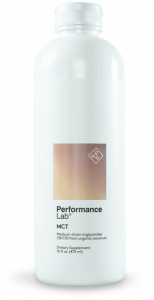
The thought is the body cleared out some old broken junk in during the fast and now its time to remodel.
I plan to use Valter Longo’s fasting mimicking diet. In the post period from the fast I am thinking there may be some advantageous nootropic that could be used, but I do not know what that might be.
First of all, thank you for the article. I came from a google search about nootropics and IF. One nootropic I take in occasion is Modafinil. Unlike racetams that are pure, I assume there’s a small amount of binder/filler in a modafinil pill? Would this be considered breaking the fast? Secondly, the Alpha GPC I take is 50% like most, so there’s other “stuff” in there as well. Any thoughts?